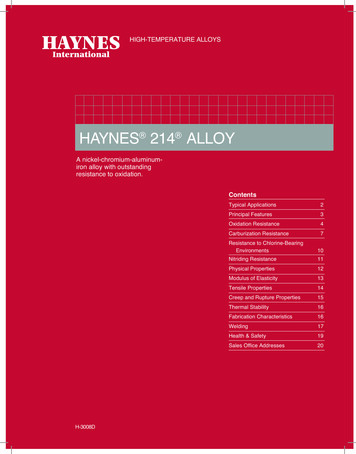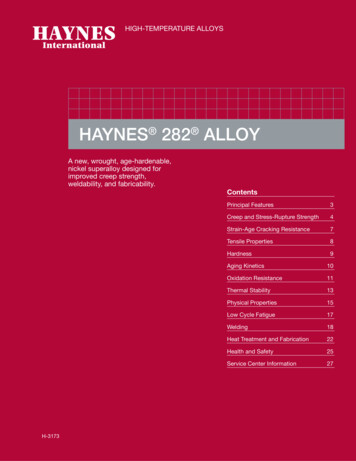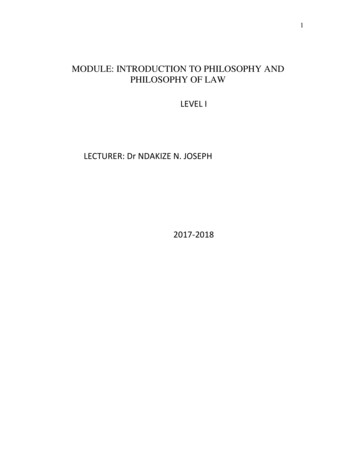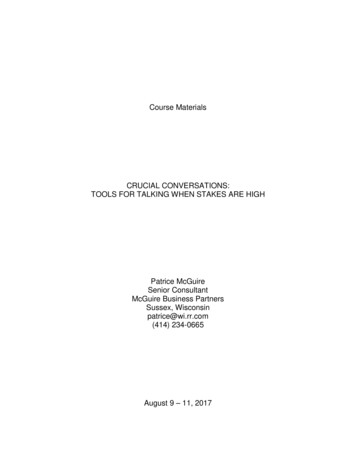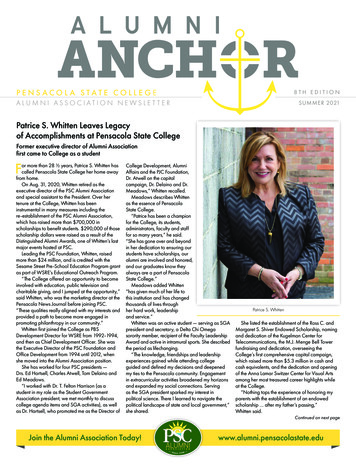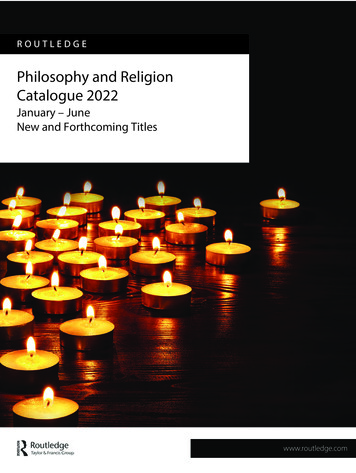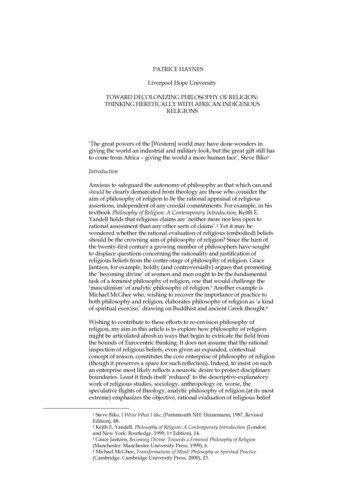
Transcription
PATRICE HAYNESLiverpool Hope UniversityTOWARD DECOLONIZING PHILOSOPHY OF RELIGION:THINKING HERETICALLY WITH AFRICAN INDIGENOUSRELIGIONS‘The great powers of the [Western] world may have done wonders ingiving the world an industrial and military look, but the great gift still hasto come from Africa – giving the world a more human face’, Steve Biko1IntroductionAnxious to safeguard the autonomy of philosophy as that which can andshould be clearly demarcated from theology are those who consider theaim of philosophy of religion to be the rational appraisal of religiousassertions, independent of any creedal commitments. For example, in histextbook Philosophy of Religion: A Contemporary Introduction, Keith E.Yandell holds that religious claims are ‘neither more nor less open torational assessment than any other sorts of claims’.2 Yet it may bewondered whether the rational evaluation of religious (embodied) beliefsshould be the crowning aim of philosophy of religion? Since the turn ofthe twenty-first century a growing number of philosophers have soughtto displace questions concerning the rationality and justification ofreligious beliefs from the centre-stage of philosophy of religion. GraceJantzen, for example, boldly (and controversially) argues that promotingthe ‘becoming divine’ of women and men ought to be the fundamentaltask of a feminist philosophy of religion, one that would challenge the‘masculinism’ of analytic philosophy of religion.3 Another example isMichael McGhee who, wishing to recover the importance of practice toboth philosophy and religion, elaborates philosophy of religion as ‘a kindof spiritual exercise,’ drawing on Buddhist and ancient Greek thought.4Wishing to contribute to these efforts to re-envision philosophy ofreligion, my aim in this article is to explore how philosophy of religionmight be articulated afresh in ways that begin to extricate the field fromthe bounds of Eurocentric thinking. It does not assume that the rationalinspection of religious beliefs, even given an expanded, contextualconcept of reason, constitutes the core enterprise of philosophy of religion(though it preserves a space for such reflection). Indeed, to insist on suchan enterprise most likely reflects a neurotic desire to protect disciplinaryboundaries. Least it finds itself ‘reduced’ to the descriptive-explanatorywork of religious studies, sociology, anthropology or, worse, thespeculative flights of theology, analytic philosophy of religion (at its mostextreme) emphasizes the objective, rational evaluation of religious beliefSteve Biko, I Write What I like, (Portsmouth NH: Heinemann, 1987, RevisedEdition), 48.2 Keith E. Yandell, Philosophy of Religion: A Contemporary Introduction (Londonand New York: Routledge, 1999, 1st Edition), 14.3 Grace Jantzen, Becoming Divine: Towards a Feminist Philosophy of Religion(Manchester: Manchester University Press, 1999), 6.4 Michael McGhee, Transformations of Mind: Philosophy as Spiritual Practice(Cambridge: Cambridge University Press, 2000), 23.1
Haynes: Toward Decolonizing Philosophy of Religionas its distinctive theoretical labour, one that delineates its disciplinaryidentity. However, I think Richard King is right when he claims thatphilosophy of religion’s apprehension over securing its borders not onlyoverlooks the extent to which the field remains steeped in its Christianhistory but betrays ‘a peculiarly western way of dividing up the world’.5 Adecolonial intervention in the philosophy of religion necessarilyreconfigures the field in dramatic ways. It does not simply demandgreater diversity in the range of religions to be assessed philosophicallybut also new modes and trajectories of thinking produced by the effort ofengaging with the ‘world-sense’6 of non-Europeans marginalized bycolonial modernity.7The article comprises three sections. The first outlines a genealogy of theconcepts ‘religion’ and ‘the human’ showing their entangled histories andtheir constitutive role in the project of colonial modernity. In tracing thisgenealogy, I draw on the work of Caribbean theorist Sylvia Wynter.Particular attention will be given to the invention of what Wynter calls‘Man’ – that is, European Man, white, bourgeois and rational – whoserves as the centre of gravity for colonial modernity and must be a targetfor critique in decolonial thinking. The second section traces theemergence of modern philosophy of religion. Informed by Wynter’sgenealogical analysis, and with a focus on David Hume’s writings, itshows how the idea of ‘true religion’ – read the ‘religion of reason’ –promotes Man as the exemplary human. The final section is where mydiscussion takes a more constructive turn. In conversation with Africanphilosophers Okot p’Bitek and Achille Mbembe, I begin to sketch howdecolonizing philosophy of religion might be approached, particularly inlight of African indigenous religions. Where there have beendevelopments in broadening the scope of philosophy of religion beyondthe Judeo-Christian tradition, these largely focus on Asian religions:Buddhism, Hinduism, Confucianism or Daoism. Indigenous religions aregenerally neglected.8 By treating indigenous religions as worthy ofattention, philosophy of religion can begin to challenge Eurocentricdevelopmental accounts of such religions, whereby they are viewed asahistorical and primordial, and so inherently primitive in comparison tothe so-called historical ‘world religions’. Taking its cue from Wynter’sdecolonial theory, this article argues that a central task for decolonizingRichard King, ‘Philosophy of Religion as Border Control: Globalization and theDecolonization of the ‘Love of Wisdom (philosophia)’ in Purushottama Bilimoriaand Andrew B. Irvine, eds., Postcolonial Philosophy of Religion (Dordrecht:Springer, 2009), 45.6 Oyèrónkẹ ́ Oyěwùmí, The Invention of Women: Making an African Sense of WesternGender Discourses (Minneapolis: University of Minnesota Press, 1997), 2-3.Oyěwùmí offers this term as an alternative to ‘world-view’, which reflects aWestern privileging of the visual and the detached observer.7 Briefly, by ‘colonial modernity’ I mean, the way in which European modernityand its ideals (autonomous, universal reason; freedom; progress) includes as itsconstitutive counterpart an underside, namely, colonized spaces and peoples,beginning with the ‘discovery’ of the Americas. Importantly, the term alerts usto patterns and relations of power that enable Euro-American control of theeconomy, authority, gender and sexuality and knowledge and subjectivity ofcolonized peoples, even after formal mechanisms of colonialism have beendismantled.8 I am aware of only one major study that seriously engages with indigenousreligions in doing philosophy of religion, which is Arvind Sharma’s A PrimalPerspective on the Philosophy of Religion (Dordrecht: Springer, 2006). This book is amuch needed contribution to the field. However, by using John Hick’s model ofphilosophy of religion as his framework, Sharma’s approach may be chargedwith not going far enough since it only extends the religious material used inphilosophy of religion, without rethinking its terms and methods in light ofreligions that may challenge the prevailing dogmas of the field.5Journal for Cultural and Religious Theory (Fall 2019) 18:3401
Haynes: Toward Decolonizing Philosophy of Religionphilosophy of religion is re-imagining the human beyond the domain ofMan. Moreover, it invites us to undertake this task by ‘thinking with’ thetheoretical and practical intelligence of African indigenous religions andindigenous religions more broadly.Religion in Colonial Context: Inventing ManThe heliocentric cosmology of Copernicus; the Portuguese exploration ofcoastal sub-Saharan Africa; and Columbus’ ‘discovery’ of the Americas in1492 would be pivotal moments in Europe’s passage to modernity. AsWynter explains in a number of her essays, such moments challengedtheocentric ways of knowing and being, based on the Judeo-Christianorder and value code: Spirit ( life)/Flesh ( sin and death).9 Thetheological notion that heaven and earth are ontologically distinct wouldgive way to the secular idea that the universe was created ‘for the sake ofhumankind’ (propter nos homines),10 thereby permitting the rationalinvestigation of both the heavens and the earth according to discerniblelaws of nature. Similarly sacred geography would be transformed. Thedivision of the earth into habitable and inhabitable zones (the latter heldto be outside of God’s grace) would give way to an anthropologicaldistinction between the lands of civilized (i.e. European) peoples and thelands of barbarous (non-European) peoples. Furthermore, and mostimportantly for Wynter, while the humanism of lay thinkers such as Picodella Mirandola (1463-1494) could hardly be viewed as anti-Christian, itnevertheless marked a departure from thinking the human as the fallen,subordinate other to God’s sovereignty. The idea of the True ChristianSelf (homo religiosus) would be increasingly supplanted by the ‘rationalpolitical subject of the state’ (homo politicus).11According to Wynter, the gradual waning of ecclesial authority and itstheocentric perspective in Western Europe – a process she calls the‘degodding’ or ‘de-supernaturalization’ – enabled the invention ofmodern genres or modes of Man. The first phase of ‘degodding’ thehuman (spanning from 1492 to the eighteenth century) would see theconstruction of what Wynter labels ‘Man1’, that is, Man as ‘ratiocentric’yet ‘hybridly religio-secular’.12 The second phase of ‘degodding’(occurring from the late eighteenth century onwards, with Darwin’stheory of evolution being an especially catalyzing event) establishes‘Man2’: ‘homo economicus’, a biocentric, purely secular figure.13Wynter makes two important observations regarding the process of‘degodding’ by which Euro-American modernity would be formed. First,while the onto-epistemological orders upholding Man1 and Man2 markepochal ruptures with theocentric medieval Europe, they neverthelessremain informed by ‘the matrix Judeo-Christian formulation of a generalorder of existence’.14 The Untrue Christian Others posited in opposition tothe True Christian Self ‘was to be reinscripted, from the sixteenth centuryonwards, as the new Untrue Human Others to the “true” human that isMan, in its two forms’.15 Thus, the anthropocentric turn from God to ManMuch of my discussion in this section draws on: Sylvia Wynter, ‘Unsettling theColoniality of Being/Power/Truth/Freedom: Towards the Human, After Man,Its Overrepresentation – An Argument’, The New Centennial Review, Vol. 3, No. 3(Fall 2003), 257-337.10 Wynter, ‘Unsettling the Coloniality of Being/Power/Truth/Freedom,’ 278.11 Wynter, 277.12 Ibid., 282.13 Ibid., 282.14 Ibid., 318.15 Ibid., 318.9Journal for Cultural and Religious Theory (Fall 2019) 18:3402
Haynes: Toward Decolonizing Philosophy of Religion(both 1 and 2) that ushers in the modern, secular west neverthelesspreserves the basic normative orientations of Latin Christianity.Historian of religion, Daniel Dubuisson suggests that if Christianity wereto be characterized by a single notion it would be that of opposition. Mostlikely he overstretches his argument. Nevertheless, he is not withoutgrounds when he claims that Christianity ‘rests on a system of antitheticalcategories or principles. It is par excellence the domain that constituteditself “against” what was external to it (pagans, heretics, atheists, etc.),while at the same time defining itself through a series of clear-cutdichotomies’.16 In Wynter’s decolonial thought, the representation ofdifference in terms of oppositionality would govern how ChristianEuropeans viewed those peoples ‘discovered’ in West Africa and theAmericas, namely, as the inverse image of the True Christian Self:‘Enemies of Christ’. According to Wynter, this oppositional(monotheistic) logic remains operative in the uneven yet insistent shiftfrom a theocentric to an anthropocentric worldview.Wynter’s second observation concerns what she calls the‘overrepresentation’ of Euro-American Man (1 and 2) as the human ingeneral. Whereas being bound to the one true God is the acme of atheocentric Christianity, being bound to humanity by virtue of reason –understood as singular and universal – would be the acme of Renaissancehumanism. Crucially, just as an Other to the Christian God isinconceivable for the Latin Christian, equally inconceivable for theRenaissance humanist is an Other to Rational Man. For Wynter, the‘degodding’ of Western self-understanding, both ontologically andepistemically, would leave it unable to:[.] conceive of an Other to what it calls human – an other,therefore, to its correlated postulates of power, truth, freedom.All other modes of being human would instead have to be seennot as the alternative modes of being human that they are “outthere,” but adaptively, as the lack of the West’s ontologicallyabsolute self-description.17Concomitant with the invention of Man in his ratiocentric form is, Wyntertells us, the invention of the modern phenomenon of race. Prior toDarwin’s theory of evolution by natural selection (which wouldemphatically cement, by means of the biological sciences, the idea ofhierarchical racial difference among human beings) Wynter details howmodern notions of race first emerge in religio-secular form. Baldly put,she contends that the ‘non-homogeneity’ (i.e. total difference) betweenHeaven and Earth, which in turn reflected the normative Spirit/Fleshdistinction of the Christian worldview, would be replicated as the nonhomogeneity perceived in the ‘ostensibly divinely created difference ofsubstance between rational humans and irrational animals’.18 For Wynter,this difference with respect to reasoning capacities among humanpopulations (such that some peoples are closer in essence to animals thanhumans) is racialized because it is determined by Nature rather than byGod (though admittedly not a fully autonomous, i.e. secular, Nature sinceit would still be considered ‘God’s agent on Earth’19).Daniel Dubuisson, The Western Construction of Religion: Myths, Knowledge, andIdeology, trans. William Sayers (Baltimore: John Hopkins University Press, 2003),105.17 Wynter, 282, my emphasis.18 Ibid., 300.19 Ibid., 296.16Journal for Cultural and Religious Theory (Fall 2019) 18:3403
Haynes: Toward Decolonizing Philosophy of ReligionDarwin’s theory of evolution by natural selection in the nineteenthcentury enabled both the articulation of a fully secularized conception ofrace and the transmutation (but not total destruction) of Rational Man (i.e.Man1) into bio-economic Man (i.e. Man2). Displacing the line betweenrational and irrational nature in the second phase of ‘degodding’ wouldbe, argues Wynter with reference to W.E.B. Dubois, the ‘Colour Line’.This ontologically demarcates ‘between the lighter and the darker peoplesof the earth’,20 and would be reinforced at the social level in terms of theeconomically strong and the economically weak.The Emergence of Philosophy of Religion: True Religion in Praise of ManWynter’s incisive genealogical account of the invention of European Manthrough the transmutation of the True Christian Self has much tocontribute to the work of decolonizing philosophy of religion. This isbecause it discloses the complex interweavings traced by the concepts‘religion’, ‘the secular’, ‘race’ and ‘reason’, concepts that form a vitalnexus in the constitution and enduring hegemony of colonial modernity.To overlook this nexus is to aid and abet the overrepresentation of Man.One way in which we can see the entanglement of philosophy of religionwith the interests of colonial modernity is by considering its emergencealongside the terms ‘religion’ and ‘the religions’, noting their implicationin the aforementioned constellation of concepts.The Protestant Reformation, beginning in 1517 with the publication ofLuther’s Ninety Five Theses, just twenty-five years after Columbus’ firstvoyage to the Americas, would see Latin Christianity fragment into aplethora of Protestant sects alongside Catholicism. It would beconfessional disputes within Latin Christianity (often violent and bloody)that would generate both the generic concept of ‘religion’ and the plural‘religions’.For some Protestant thinkers reason could be used as a tool not simply toconstruct a systematic Protestant orthodoxy but to develop a rationalizedChristianity, one that would enfeeble divisive sectarian commitments andmagnify unity in diversity. Jenny Daggers notes that by the end of theseventeenth century the rational reconstruction of Protestant Christianityestablished two clear camps which had diverged over how the relationbetween reason and biblical revelation should be envisaged.21 The firstcamp – the ‘rational supernaturalists’ – includes thinkers such as JohnLocke who, in his work The Reasonableness of Christianity, as Delivered in theScriptures (1695), argued that the Gospels contain truths that have arational basis discernible to all (rational) people. Nevertheless, he admitsthat some biblical truths serve to enlarge reason – because they arerevealed – but do not thereby contradict it. The second camp are theDeists, those such as Lord Herbert of Cherbury (d. 1648) and MatthewTindal (d. 1733), who controversially advanced a ‘natural religion’ basedsolely on universal natural reason, one which offered rational justificationfor the existence of a creator God as well as a corresponding ethics, butexcised as superfluous appeals to (often conflicting) doctrinal assertionsbased on revelation.It would be Deism that paved the way for what Daggers calls‘Christianity transcended’, 22 that is, Christianity decentred with respect tothinking religion. In its place would be the idea of an original, naturalIbid., 310.Jenny Daggers, Postcolonial Theology of Religions: Particularity and Pluralism inWorld Christianity (London and New York: Routledge, 2013), 22-23.22 Ibid., 22.2021Journal for Cultural and Religious Theory (Fall 2019) 18:3404
Haynes: Toward Decolonizing Philosophy of Religionreligion that is independent of Christianity and held to be the universalgenus underlying the various kinds (or species) of religions in theirdeterminate particularity. (Yet putatively non-creedal, natural religionwould still resemble a distillation of certain aspects of ProtestantChristianity.) The distinction between the terms ‘religion’ and ‘thereligions’ shaped modern approaches to theorising religion in at least twosalient ways.First, as Daggers points out, it provided the basis for two tracks ofthought: philosophy of religion and religious studies. The former wouldconcentrate on universal categories available to rational scrutiny, namely,the existence and nature of God (natural theology) and the ethicalprinciples and values attending ideas of God (natural religion); whereasthe latter focused on understanding religions in their distinctiveparticularity, emphasizing the study of beliefs, myths, sacred texts,artefacts and rituals.23Second, increasing familiarity with particular or ‘positive’ religions wouldalso begin to challenge biblical or sacred narratives of human history. Thenotion of ‘religions’ invited reflection on its emergence in human historythus its natural rather than supernatural origins. The term ‘naturalreligion’ would begin to acquire a new sense, one denoting the genesis ofthe various religions in human nature. What becomes apparent here isthat, from the mid-seventeenth century on, the momentum gained by theidea of ‘natural religion’– whether conceived as a generic religionestablished by human reason alone or as particular religions arising overthe course of human history – heralds the transformation of ‘religion’from a theological to an anthropological category.In 1757 Hume’s Natural History of Religion is published, presenting hisaccount of the origin and evolution of religion in human nature based onthe findings of European travellers and missionaries. According to Hume,[.] the first ideas of religion arose not from a contemplation ofthe works of nature [which through a process of rationalabstraction led to belief in the one Supreme Being as the Deistsclaim], but from a concern with regard to the events of life, andfrom the incessant hopes and fears, which actuate the humanmind.24For Hume, then, religion (primarily) has its basis in unreflective humanemotions, principally hope and fear, and is pragmatic rather thantheoretical in orientation, concerned less with truth and more with humanflourishing in the face of natural and social contingencies.Hume’s genealogy of religion helped prepare the ground for the criticaltheories of Friedrich Nietzsche, Ludwig Feuerbach, Karl Marx, SigmundFreud and Emile Durkheim. These nineteenth century thinkers – whosework would underpin modern and contemporary forms of sociology ofreligion – viewed religion as a wholly secular phenomenon, no more thana set of dangerous deceptions that alienate us from our more authentichuman selves, howsoever envisaged. Yet we should appreciate thatsecular perspectives on religion remain continuous with those of earlymodern Christianity insofar as both treat religion as an anthropologicalcategory, one that can advocate European colonial expansion. The critiqueIbid., 24.David Hume, Natural History of Religion, in Dialogues and Natural History ofReligion, ed. John C.A. Gaskin (Oxford and New York: Oxford University Press,1998), 139.2324Journal for Cultural and Religious Theory (Fall 2019) 18:3405
Haynes: Toward Decolonizing Philosophy of Religionof religion – an undertaking set in motion by Christian thinkers inresponse to differences both within and without – forges secular,universal reason by increasingly displacing the authority of religiousbeliefs with that of Rational European Man. It would be the religiousbeliefs of ‘primitive’, non-European peoples that epitomized theenslavement of mind to irrational superstition.Interestingly, though a major Enlightenment thinker, Hume famouslydemotes reason to the passions. This appears at odds with Wynter’s claimthat the first phase of European modernity sees the invention of RationalMan. Now, there is a danger that concepts such as ‘European Man’ or ‘theWestern self’ end up advancing monolithic constructions that grosslyoversimplify a diversity of contested positions. Nevertheless, suchconcepts do capture dominant trends of thought that have shapedEuropean self-understanding. Despite some of the radical implications ofHume’s naturalist anthropology, Wynter’s Ratiocentric Man brightlyflickers in and out of view in his works, notably in his comments onreligion.Picking up on Hume’s sporadic yet approving references to the idea of‘true religion’, Andre Willis suggests three pillars on which it may bebased: i) genuine theism; ii) moderation of the passions; and iii) theformation of virtuous character.25 While Hume is usually regarded as anatheist thinker tout court this overlooks how his comments on the notionof true religion suggest his willingness to acknowledge thereasonableness of belief in God conceived as the Author of Nature.Nevertheless, insofar as Hume endorses a genuine theism this is strictly athin or basic theism that assents only to belief in an intelligent Author ofNature, without attributing to it personhood, the capacity to performmiracles or even worship-worthiness. For Hume, the most compellingaspect of a basic theism is more anthropocentric than theocentric in focus.Its real value lies in revealing the natural disposition of human cognitionwhen motivated by ‘speculative curiosity’ or the ‘pure love of truth’26 –with a nod to Descartes, we might call this the calm, philosophic passionof wonder – rather than by disagreeable passions such as fear andmelancholy.The problem, Hume argues, is that more often than not the ‘love of truth’is too refined an impulse for human religiosity. The mind’s proclivity toposit God as the Author of Nature typically produces a vulgar theismexcited by unconstrained fears and hopes. For Hume, genuine theism candirect religion to its ‘proper office’,27 its truth, namely the enhancement ofmoral and civic life (achieved through fostering the calm passions andcultivating virtue). And while Hume recognizes that true religion is rarelyaccomplished, he nevertheless considers it the ideal form of religion.Though Hume’s true religion is not founded on pure reason, for it affirmsthe ineliminable passional aspect of religious beliefs, it is my contentionthat its emphasis on a genuine theism, the calm passions, and thevirtuous, civic person, envisions the human in ways that more or less maponto the contours of Man as described by Wynter. Indeed, Hume’scritique of reason is not in order to abandon it but only to delimit itprecisely so that Man can emerge as a free, truly (though not purely)Andre C. Willis, ‘The Potential Usefulness of Hume’s “True Religion”’, TheJournal of Scottish Philosophy, Vol. 13, No. 1 (2015), 7.26 Hume, Natural History of Religion, 140.27 ‘The proper office of religion is to regulate the heart of men, humanize theirconduct, infuse the spirit of temperance, order and obedience’, David Hume,Dialogues Concerning Natural Religion in Dialogues and Natural History of Religion,ed. John C.A. Gaskin (Oxford and New York: Oxford University Press, 1998),122.25Journal for Cultural and Religious Theory (Fall 2019) 18:3406
Haynes: Toward Decolonizing Philosophy of Religionrational thinker able to pursue scientific knowledge regarding theworkings of nature without becoming sidetracked by irresolvable, andsocio-politically contentious, theological and metaphysical mysteries.According to Hume, the irrationality and superstition of vulgar theiststhat continued to endure in civilized, enlightened Europe could beexplained as a consequence of a lack of proper instruction. The samecould not be said for non-European savages whose (perceived) stuntedrationality was, for Hume, to be attributed not to the want of educationbut to immutable racial differences inscribed by nature. In a notoriousfootnote contained in his essay, ‘Of National Character’, Hume writes,I am apt to suspect the Negroes and in general all other species ofmen.to be naturally inferior to the whites. There never was acivilized nation of any other complexion than white.Noingenious manufacturers amongst them, no arts, no sciences.Such a uniform and constant difference could not happen if nature hadnot made an original distinction betwixt these breeds of men.28While Hume does not explicitly use the term ‘race’ in this passage, it isnevertheless clear that he means to refer to a natural distinction betweenwhites and non-whites with respect to reasoning abilities that isunalterable.Although the footnote is the only place in Hume’s writings where he isunequivocally racist, Emmanuel Eze persuasively argues that it is nostray and careless remark but one grounded in his epistemology and his‘science of man’. On Eze’s reading, Hume considers the Negro mind to beunable to perform active reasoning, whereby the mind is able totranscend the immediacy of sense perceptions in order to think objectsand their relations in abstract ways.29 It is precisely the inability to thinkabstractly that, for Hume, prevents the ignorant savage from arriving atthe idea of God. We see an illustration of this in Hume’s DialoguesConcerning Natural Religion, when Cleanthes explains that the minds ofsavages are cognitively weak insofar as their causal reasoning is unable toproceed from tangible effects to increasingly remote and abstract causes.In Cleanthes words, and here I quote at length,It sometimes happens, I own, that the religious arguments havenot their due influence on an ignorant savage and barbarian; notbecause they are obscure and difficult, but because he never askshimself any question with regard to them. Whence arises thecurious structure of an animal? From the copulation of itsparents. And these whence? From their parents. A few removesset the objects at such a distance, that to him they are lost indarkness and confusion; nor is he actuated by any curiosity totrace them farther. But this is neither dogmatism nor scepticism butstupidity.your [Philo’s] greatest errors proceed not frombarrenness of thought and invention, but from too luxuriant afertility.30The barbarous polytheist is stupid and unquestioning, whereas civilized(i.e. European) Man suffers from an excess of reason that when applied toIbid., 360, n. 120, my emphasis.Emmanuel C. Eze, ‘Hume, Race, and Human Nature’, Journal of the History ofIdeas, Vol. 61, No. 4 (October 2000), 695.30 Hume, Dialogues Concerning Natural Religion, p. 57, the final emphasis is mine.A similar line of reasoning to that of Cleanthes is present in Hume, NaturalHistory of Religion, 137.2829Journal for Cultural and Religious Theory (Fall 2019) 18:3407
Haynes: Toward Decolonizing Philosophy of Religionthe idea of God can lead to dogmatism or scepticism, which admittedlycarry problems of their own but at least are emblematic of elevatedminds.For Hume, then, the uninstructed savages of America, Africa and Asianremain frozen at the primitive stage of religious consciousness,unacquainted with the idea of God, the supreme Author of Nature. This isbecause, ‘Such a magnificent idea is too big for their narrow conceptions,which can neither observe the beauty of the work [of nature], norcomprehend the grandeur of its author’.31 Here we see Hume draw a clearconnection between rational capacities and religion: the savage mind isintellectually inferior to that of civilized, monotheistic Europeans.Even though Hume’s naturalist critique of reason would disconcertEnlightenment rationalists, when we consider his remarks on bothreligion and race together we can see how reason is extolled in order toreiterate the philosophical anthropology of colonial modernity in whichMan is upheld as the human per se, its essence fully realized. As t
Haynes: Toward Decolonizing Philosophy of Religion Journal for Cultural and Religious Theory (Fall 2019) 18:3 402 philosophy of religion is re-imagining the human beyond the domain of Man. Moreover, it invites us to undertake this task by 'thinking with' the theoretical and practical intelligence of African indigenous religions and
